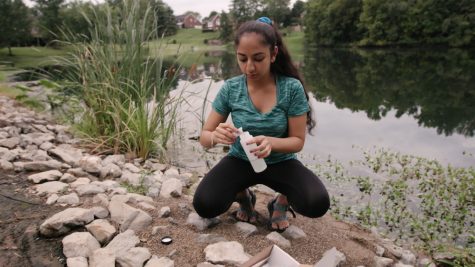Speaker Day educates students about ethics in science
Alumnus Sam McVeety gives a talk about digital redlining.
I’m very grateful for the younger reps who stuck around to help put signs up and deal with issues. — junior Liam Will
As the clock struck 8 a.m. on April 22, students poured into the Huss Center, greeted with the blue title slide of a PowerPoint presentation displaying the words “Digital Redlining.” Alumnus Sam McVeety, who graduated in 2004 and now works at Google, kicked off Speaker Day 2019 with a presentation about how the analysis of internet patterns contributes to housing inequality and the role of tech companies in social justice issues. His talk embodied the theme for this year’s Speaker Day, which was ethics in technology.
Hours of planning went into Speaker Day. Upper School Council (USC) members pored over spreadsheets to assign speakers and activities to all members of the Upper School.
“I’m very grateful for the younger reps who stuck around to help put signs up and deal with issues,” junior Liam Will said, vice president of USC. “They were all very efficient and helpful because there are so many little things, like welcoming speakers, and all that.”
Due to the rain, many service activities were canceled, but Speaker Day went on all the same. After McVeety’s talk, students went on to their first and second speakers.
There were a plethora of speakers available for students to choose from.
For example, Dr. Debra DeBruin, a professor of bioethics at the University of Minnesota, presented on the role of pregnant women in research.
“The reality is that there was a long history of excluding women of childbearing potential from research,” DeBruin said. “So, can you imagine why? Why did we routinely exclude women from research?”
“Because they didn’t want to affect the woman’s ability to have a child, and they saw that as her primary usefulness,” sophomore Katherine Goodman responded.
“That’s why,” DeBruin said. She went on to delve deeper into the debate over whether the benefits of including pregnant women outweighed the benefits, engaging the students in the room throughout.
After students attended sessions by both of their assigned speakers, they gathered in the Huss Center for the second time to watch “Science Fair,” a documentary about the Intel International Science and Engineering Fair, or ISEF, produced by National Geographic.

A film still from “Science Fair” directed by Cristina Costantini and Darren Foster. ISEF Finalist Anjali Chadha collects water for her project.
Three students will be attending ISEF this year in May. By showing the film to the entire school, the community learned more about what was going to happen at the international competition.
Students gave their thoughts on the documentary.
“It was pretty good,” sophomore Isobel Alm said. “Seventeen out of ten, I would say.”
Sophomore Gracie Tilney-Kaemmer had doubts at first but the movie caught her attention.
“I thought it was much more interesting than I was expecting it to be and it really gave me an interesting insight on ISEF,” she said.
To make up for the canceled off-campus service activities, USC decided to show Hidden Figures and the Imitation Game. However, on-campus activities still happened, like the discussion about a sustainability plan for the Upper School and a Friends of the Mississippi River presentation in the library.
By the end of the day, students emerged from Speaker Day having gained new knowledge about issues in science and technology.
Melissa Nie is the Director of RubicOnline. This is her fourth year on staff. Melissa believes that everyone has a story to tell, and high school journalism...